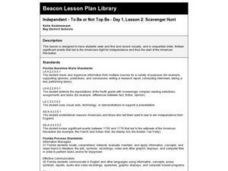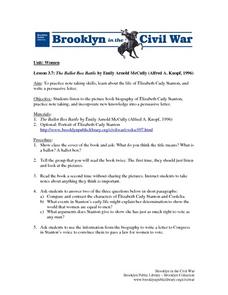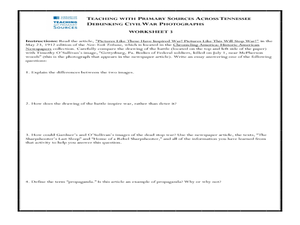Library of Congress
Stars, Stripes and Symbols of America: Comparing Our Flag, Past and Present
Your young historians will compare and contrast the details of the American flag today with an an image of the nation's flag from the post-Civil War era, and identify the flag's importance as a national symbol through analysis worksheets...
Library of Congress
Determining Point of View: Paul Revere and the Boston Massacre
If you're teaching point of view, this is the lesson for you! First, decipher the writer's point of view from a primary resource, then compare and contrast the primary source with a secondary source to explore the Paul Revere's engraving...
Alabama Department of Archives and History
Yellow Journalism
What role did yellow journalism play in bringing the United States into war with Spain? As part of their study of the Spanish-American War, class groups examine newspapers of the times and other texts and then produce their own...
University of California
Principles vs. Practices
Have you ever wondered what your own World Order would look like? Scholars use primary and secondary documents as well as video clips to investigate and analyze the Cold War. Using the sources, the principles and practices of nations...
Curated OER
The Federalist Papers
Students identify the Articles of Confederation and explain why it failed. They explain the argument over the need for a bill of rights in the Constitution and James Madison's role in securing its adoption by first Congress. Finally,...
Curated OER
A Dictionary of Democracy
Middle schoolers create dictionary of terms for citizens of a democracy, using events and biographies from both their state's history and U.S. history.
Curated OER
My Brother Sam is Dead: A study of the Revolutionary War
Fifth graders complete an analysis of the Revolutionary War through literature. After "My Brother Sam Is Dead," students create a time capsule containing items that would be relevant during the Revolutionary War. They identify key...
Curated OER
Louisiana's Indian Tribes At the Time of the Louisiana Purchase
Students research primary readings concerning first hand accounts of the Indian tribes living in and around Louisiana's River systems. They complete a brief character sketch of each tribe characterized in the digital readings. These...
Curated OER
Decision -Making by Parliamentarians: Issues and Decision-Making
Students, using what they know about what influences a representative's decision-making, solve current issues/problems provided by the teacher.
C-SPAN
Foreign Interference in U.S. Elections
With election security looming large for 2020, pupils decide what should be done to protect them from foreign interference. A series of videos, including interviews with national security officials, elected representatives, and experts...
Curated OER
100 Years Ago in History
Students conduct Internet research to investigate century-old historic events. Working individuallly or in pairs, they research assigned topics and construct a timeline for events that occured on the same day.
Curated OER
Vocab Grabbing the Preamble to the U.S. Constitution
Students identify concrete and abstract nouns in the preamble to the Constitution, and complete Frayer Model graphic organizers using history and current events as examples of American values. For this preamble lesson plan, students use...
Curated OER
Orangeburg Massacre
Students study the Orangeburg Massacre. In this social studies instructional activity, students discuss the Civil Rights Movement and the protest movements that took place. Students examine the events that led up to the Orangeburg...
Curated OER
Independent - To Be or Not Top Be - Day 1, Lesson 2: Scavenger Hunt
Fifth graders research the thirteen significant events that lead to the start of the American Revolution.
Curated OER
The Ballot Box Battle
Students practice note taking skills, study the life of Elizabeth Cady Stanton, and write a persuasive letter. They listen to the picture book biography of Elizabeth Cady Stanton and use the information from the biography to write a...
Curated OER
Skepticism Toward Government
Students explain how the media portrays certain events and its effects on public opinion of government. They focus on Watergate, the Vietnam War, and the Clinton impeachment. They write essays about skepticism promoted by the media.
Middle Tennessee State University
Who's Afraid of the Big Bad Wolf? A Comparison in American Culture
As part of their study of the Progressive Era, class groups examine a 20th century version of "The Three Little Pigs" through a New Era lens and identify how ideals such as the value of hard work, creativity, and problem solving, etc.,...
Curated OER
Three Days at Gettysburg
Eighth graders discuss why the Battle of Gettysburg was important to the Civil War. In groups, they identify the major events of each day of the battle. They analyze how the battle changed the direction of the war and discuss the outcome.
Curated OER
A Dictionary of Independence
Students use events and biographies from their state's history and U.S. history, to create a dictionary of terms for citizens of a democracy.
Curated OER
Teaching with Primary Sources Across Tennessee: Debunking Civil War Photographs
Young scholars analyze photographs and texts using primary source analysis. In this primary source activity students determine whether the photographs and text are truthful.
Curated OER
Civil War Battles: The Reporter's Perspective A WebQuest
Students interpret historical evidence presented in primary and secondary resources. In this research skills lesson, students research the job of reporting for new agencies during the American Civil War as they complete the provided...
Curated OER
"I Hear America Singing": Controversy and Music in the Mexican War
Eighth graders examine the Mexican War and its outcome through music. In this primary source analysis instructional activity, 8th graders analyze the lyrics of selected songs to consider the 2 perspectives regarding U.S. involvement in...
Library of Congress
Investigating the Building Blocks of Our Community’s Past, Present, and Future
As Ken Jennings said, "There's just something hypnotic about maps." Certainly, the longer you look at them the more you can learn. In this project-based learning lesson plan, individuals study both historic and present-day maps of their...
National Endowment for the Humanities
Upton Sinclair, Theodore Roosevelt, and Harvey W. Wiley
Though Upton Sinclair's novel The Jungle shocked the American public into a thorough examination of the meat-packing industry, the author was disappointed that his book's main argument—the exploitation of American immigrants—was not part...

























